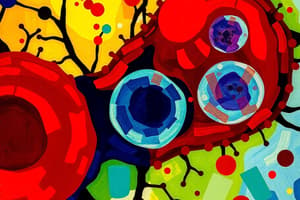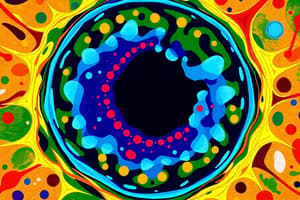Podcast
Questions and Answers
What is the primary function of a neuron?
What is the primary function of a neuron?
- To transmit electrical signals in the nervous system (correct)
- To absorb nutrients for the body
- To create hormones for regulation
- To support immune functions
Which part of the cell is primarily responsible for energy production?
Which part of the cell is primarily responsible for energy production?
- Nucleus
- Endoplasmic reticulum
- Ribosomes
- Mitochondria (correct)
What is the role of the circulatory system?
What is the role of the circulatory system?
- To transport oxygen and nutrients to cells (correct)
- To filter waste from the blood
- To control hormone levels
- To regulate body temperature
Which of the following is a key component of the immune system?
Which of the following is a key component of the immune system?
What is the primary purpose of enzymes in biological reactions?
What is the primary purpose of enzymes in biological reactions?
Flashcards
Computer program
Computer program
A set of instructions that tells a computer what to do.
Application (App)
Application (App)
A specific type of computer program that allows users to interact with a computer.
Code
Code
The instructions within a program that tell the computer how to perform a specific action.
Software
Software
Signup and view all the flashcards
Hardware
Hardware
Signup and view all the flashcards
Study Notes
Strategies of Active Learning (2)
- Active learning strategies encompass a range of teaching and learning methods.
- The nature of science is a complex topic that involves the history and nature of science development.
- The history of science spans from ancient times to the 20th century.
Nature of Science
- Science relies on observation of phenomena and creation of theories to explain observations.
- Scientific knowledge and understanding is a dynamic and evolving process.
- New discoveries and understandings may lead to modifications and changes in existing theories.
- Science considers logical thinking to connect data with conclusions.
- Generating scientific ideas and solutions is a creative process, not merely a data-driven one.
- Scientific activity is a complex social endeavor.
- Scientists aim to avoid biases in their work.
- Scientific activity follows ethical guidelines.
History of Science (Ancient to 20th Century)
- Early human development did not require sophisticated tools essential for scientific recording.
- Early civilizations, like the Egyptians and Babylonians, developed understanding of chemistry (e.g., transformations/alterations in food through cooking and fermentation).
- Other aspects of knowledge were being developed, such as observation of celestial patterns to learn about agriculture.
- Later Greek philosophers developed atomic theories and laws of motion.
- Alchemy (300 BCE - 600 CE), a philosophical practice, was prevalent in various cultures—primarily focused on methods related to changing substances (like turning lead to gold).
- The era of Islam (600 - 1000 CE) saw further development in chemistry, physics, and biology, emphasizing techniques in distillation, evaporation, and chemical analysis.
- The Renaissance (16th-17th centuries) in Europe led to modern atomic concepts and other scientific advancements, including the law of motion.
- The 18th and 19th centuries saw fundamental developments in chemistry and physics, including the Modern chemical revolution associated with Lavoisier.
- The 20th century brought advancements in molecular structure, the rise of modern chemistry industries, and other discoveries including quantum physics and the structure of DNA.
Learning Theories
- Behaviorism: Focuses on observable behavior and its modification through reinforcement (and punishment); the learning process is viewed as change of behavior in response to stimuli
- Cognitivism: Focuses on mental processes (like thinking, memory, and problem-solving) related to receiving, processing, and organizing information with regards to existing cognitive schemas; learning occurs as a change in these mental structures.
- Emphasizes the role of existing knowledge as a foundation for new learning.
- Constructivism: Learning involves active construction of knowledge through interaction with the environment.
- Connectivism: Learning is a process of building connections in a rich information, networked society, focusing on lifelong learning.
- Humanism: Learning is seen within the broader framework of human needs and potential.
Active Learning Methods
- Inquiry-Based Learning (IBL): Students pose research questions and investigate topics through experimentation, observation, and data analysis.
- The teacher facilitates the inquiry process.
- Project-Based Learning (PBL): Students work in groups to investigate complex problems and create projects requiring collaboration, in-depth exploration of topics, and applying learned concepts.
- The 5 E's Learning Cycle: This is a framework for planning and delivering lessons around a central concept.
- Engage: capture students' attention and connect new information with prior knowledge
- Explore: allow students to investigate ideas through hands-on activities
- Explain: connect activities with formal definitions.
- Elaborate: broaden student's understanding with additional applications.
- Evaluate: observe students understanding and provide feedback.
Assessment of Learning
- Summative assessment focused on evaluation of learning outcomes at the end .
- Formative assessment focused on ongoing feedback to assist in student learning.
- Alternative assessment: a variety of methods to assess student learning that include portfolios, journals, and projects rather than standardized, multiple-choice assessments.
Online Resources
- Online science communities (like Reddit science forums) allow for global collaboration.
- Interactive science simulators (like PhET simulations) and virtual labs offer opportunities for student experimentation.
- Collaborative digital concept maps (using tools like MindMeister) allow students to organize and visually connect scientific concepts.
- Citizen science projects (like Zooniverse) enable student participation in real-world scientific research activities.
Other concepts
- Peer assessment allows students to evaluate one another's performance, improving critical thinking skills.
- Self-assessment provides students with mechanisms for self-reflection, increasing their awareness of their learning.
- Portfolios are used to showcase student work, accomplishments, and development across various assessments.
- Rubrics are used to explain criteria and levels of understanding, assisting with evaluation process; provide standard, clear criteria.
Studying That Suits You
Use AI to generate personalized quizzes and flashcards to suit your learning preferences.




